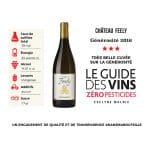Is organic more expensive than chemically farmed wine?
On farm visits at Chateau Feely we are often asked about the cost of organic versus chemically farmed wine. Yes, on the shelf on average organic is more expensive than non-organic but as a marine biologist in France likes to put it ‘I buy organic because I can’t afford a cancer treatment.’ Its not as simple as x versus y.
Costs of organic wine versus conventional chemically farmed wine in Nouvelle Aquitaine in France
Research by the Gironde (Bordeaux) Chamber of Agriculture shows that cost of production for organic is 28 percent higher largely due to two forces: an average 20% reduction in production volumes and higher labour costs.
While there is no data on the price of organic versus conventional bulk AOC wine in the region a straw-poll of a few of my winegrower friends indicates that the bulk market price was negotiating at around 27% more for organic in 2018. The good news is that in 2019 that picture is a little happier as demand for organic has increased with more consumer awareness.
While there is little revenue incentive (2018) to convert to organic, in general, organic growers can sell their wine more easily than conventional growers since it is a part of the market that is growing faster than the rest.
If you see a bottle of wine for 9.99 euro and another for 12.79 euro from the same area and of the same style except the more expensive one has the EU organic logo – which will you pick up? Most people would go for the cheaper option unless they understand all the issues at stake. For a quick hit read my ten reasons to pat yourself on the back when you buy organic.
When we see those chemically farmed bottles on the shelf we don’t see the hidden costs in the cheap conventional wine – these cost are what we economists call ‘externalised costs’.
Externalised costs
Our pricing system for conventional wines excludes ‘externalised costs’ – the cost of cleaning a community’s water poisoned by pesticides, of treating cancer, nervous system disruption and endocrine disruption (see our organic and biodynamic trail section on why choose organic).
Organic farming delivers relatively more expensive food on the face of it but it is the true cost as opposed to chemically farmed food where you are only seeing a small part of the real cost. The pollution and health implications of the cheap chemical solutions are ‘externalised’ and not shown in the price – things like treating cancer and nervous-system disruption and cleaning polluted water. They are left out, set aside for someone else, or for future generations, to pay.
Who pays for farmers with cancer? for people with nervous system disruption that means they can no longer work or drive? for an entire community’s water source poisoned so they can no longer drink the water? (and have to buy water in plastic bottles instead – another whole can or worms). These costs are not reflected in the end price of the cheap wine on the shelf. It is passed onto the state, to the community. This is wrong. The polluter should pay. The manufacturer of these products and the farmers who have choose to use these products should pay -this would then in turn mean the price of the end product would go up.
Ironically those who are not polluting have to pay to be certified while those who are using highly toxic systemic chemicals are not controlled and pay nothing. It should be the other way around. Organic certification should be free and those using systemics should have to pay to be controlled so that we know they are using these products in the correct way and within the permitted levels. There should be a pollution fee for those polluting our earth, air and water.
An even more serious long term cost: destruction of soil
The long term destruction of the soil by chemical farming is another serious consequence. It is far more easily destroyed that built. Some soil scientists estimate that there are less than 60 harvests left in the world if we continue intensive farming as it is being done today. Without soil there will be no food, another long term cost that is not accounted for.
Conclusion: in the long run organic is not more expensive
Externalised costs like cancer, nervous system disruption and endocrine disruption, destruction of water sources and destruction of soil mean that choosing the cheaper option of chemical farming short term, we are in fact choosing the more expensive outcome long term.
See my article on why you must question when someone says they are organic but not certified. I would wager that they are not really farming organically. The benefit of the organic certification outweighs the cost of the certification.
Come and learn more about wine with a visit to Chateau Feely in South West France ; stay or do a multi day course or multi day tour. You can read about the story of this organic vineyard, wine school and farm – the series includes three books
Grape Expectations: A Family’s Vineyard Adventure in France (Caro Feely Book 1).
Saving Our Skins: Building a Vineyard Dream in France ( Caro Feely book 2 )
Glass Half Full: The Ups and Downs of Vineyard Life in France (Caro Feely Book 3).
Summersdale publishers have also made the 3 book series available as a bundle for the UK market Caro Feely (3 Book Series)
.
You can also order a case of natural and no sulfite added organic wine including shipping in the EU. Join the mailing list to receive a seasonal newsletter, events, wine pairing, recipes and more info on this topic at the bottom right of this page.









